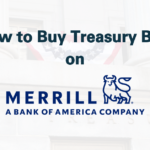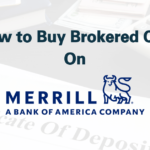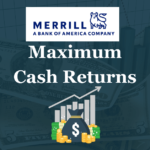What are the best Merrill Edge CD rates and Merrill Lynch CD rates in 2024, and are they better than other brokered CDs? In the table below, you will see the top yields for Merrill Edge CDs in May 2024. Merrill Edge CD rates can often change, so we suggest looking at Merrill Edge’s website for the most real-time information.
Merrill Edge CD Rates 2024
Merrill Edge offers brokered certificates of deposit, which are different from standard bank-issued CDs, as brokered CDs are only accessible to customers with brokerage accounts such as Merrill Edge. Merrill Edge does not issue these CDs. Instead, the brokerage provides both newly issued CDs from different banks and CDs resold by other investors on a secondary market.
The following table displays the top Merrill Edge and Merrill Lynch CD rates today per maturity term for new issue CDs in Merrill Edge’s marketplace*:
| New Issue CD Term | APY | Minimum Investment | Last Month's Rates |
|---|---|---|---|
| 3-month CD | 5.35% | $1,000 | 5.30% |
| 6-month CD | 5.35% | $1,000 | 5.30% |
| 9-month CD | 5.25% | $1,000 | 5.25% |
| 1-year CD | 5.25% | $1,000 | 5.10% |
| 3-year CD | 5.35% | $1,000 | 5.05% |
| 5-year CD | 5.35% | $1,000 | 4.60% |
| 5-year+ CD | 5.35% | $1,000 | 4.20% |
APYs shown are as of May 3, 2024. Click to expand on mobile.
*Note: Merrill Edge CD rates and Merrill Lynch CD rates can change. YieldAlley suggests checking Merrill Edge’s website for the latest information.
🚨 You should know…
Merrill also offers money market funds, Treasury bills, and Treasury ETFs. These cash yields can be higher than what brokered CDs offer.
Compare all cash products on MerrillBuying CDs on Merrill Edge
- Merrill Edge Account Required: To access Merrill Edge CD rates, you must have a brokerage account with Merrill Edge to buy and hold your Merrill Edge CDs.
- Fee for buying new-issue CDs: None.
- Fee for secondary CDs: Merrill Edge charges a $1 fee per CD for secondary trades online, with a $10 minimum fee and a $250 maximum.
- Minimum investment per New-Issue CD: $1,000. You can buy more new-issue CDs in increments of $1,000.
- FDIC Insurance: Yes. Merrill Edge’s brokered CDs offer FDIC insurance of $250,000 per bank per depositor. For example, you have expanded FDIC coverage if you buy three CDs on Merrill Edge from three banks up to $750,000.
Merrill Edge CD Fees and Key Information
Frequency of Interest Payments: It depends. The frequency of interest payments on Merrill Edge varies depending on the CD. CDs with a maturity period of less than one year typically pay interest only when they mature. For example, Merrill 1-year CDs will typically pay interest only when they mature, although some CDs may pay interest every six months. However, for CDs with longer maturity periods of 18 months or more, interest may be paid every six months, every three months, or every month.
Monthly Fees: None. This is common for CDs.
Compounding: None. Brokered certificates of deposit (CDs) accumulate simple interest, while CDs offered by banks accrue compound interest. With brokered CDs, the interest earned remains constant throughout the duration of the CD, as opposed to increasing with a bank CD.
Early Withdrawal Penalty: None. With Merrill Edge brokered CDs, there are no early redemption fees like there are for bank-issued CDs, but trading a brokered CD on the secondary market means you may receive less than the original purchase price.
Auto-Rollover: Yes. Merrill Edge offers an Auto-Rollover Service, which will reinvest your CD when it reaches its maturity date. A different bank may provide a new CD than the one that issued the original CD. Alternatively, you can renew your CDs with a CD ladder savings strategy.
Merrill Edge IRA CD: Yes. If you have an IRA account with Merrill Edge, you can use that IRA to buy brokered CDs.
Types of CDs Offered By Merrill Edge and Merrill Lynch
New Issue CDs: When a bank or financial institution introduces a new investment opportunity to the public, they may issue a new issue CD. This certificate of deposit has a set duration and rate of interest, enabling investors to earn guaranteed profits on their investment for a designated timeframe.
Secondary CDs: A secondary CD is purchased on the secondary market from an existing owner. This allows investors to buy or sell a CD before its maturity date.
Callable CDs: A callable CD gives the issuing bank the option to call back the CD before the end of its maturity date. This means that the bank can redeem the CD early, usually after a specific period of time or on set dates. This feature generally is used when the bank wants to take advantage of lower interest rates.
Non-Callable CDs: A non-callable CD cannot be recalled by the bank before maturity. This means that once you invest in a non-callable CD, the issuer cannot call it back or return your money until the agreed-upon maturity period. This makes non-callable CDs a more secure and predictable investment option.
Why is My Merrill Edge CD Losing Money?
If your CD appears to lose money, it could be due to rising interest rates and your Merrill Edge CD rates today are now lower than the current interest rate. However, holding your CD until maturity means you will be guaranteed your original principal upon maturity, plus your interest payments.
We recommend ignoring any fluctuations in the CD value if you plan on holding your CD to maturity.
Merrill Edge Cash Equivalents and Other Offerings
Cash equivalents are “as good as cash” investments regarding their liquidity and reliability. They are short-term, highly liquid investments readily convertible to known amounts of cash and usually considered virtually risk-free. These are typically investments with a short maturity period of 90 days or less.
Some cash products include short-term brokered CDs mentioned above, money market funds (Merrill offers institutional money market funds for zero minimum investment), and Treasury bills. Merrill offers many cash equivalent options.
I’ve Evaluated Merrill Edge’s CD Rates. Are These CDs a Good Fit for Me?
After reviewing the CD rates from Merrill Edge, it’s important to check if these CDs align well with your financial goals and circumstances.
What are some considerations that might be relevant to you?
- Risk Tolerance: Consider your willingness to take on financial risks. CDs are virtually risk-free investments with FDIC insurance and offer a guaranteed rate of return. But they typically offer lower returns than riskier assets like stocks or mutual funds and are less flexible compared to Treasuries.
- Financial Goals: Identify your short-term and long-term financial objectives. CDs can be a good choice for short-term goals or as a stable component in a diversified investment portfolio.
- Interest Rates: Evaluate the current interest rates. If they are favorable, CDs can be an attractive option as they offer fixed, guaranteed returns.
- Capital Preservation: If your priority is safeguarding your capital rather than high returns, CDs can be a suitable choice as they are low-risk investments.
- Income Source: For those seeking a steady income source, particularly retirees, CDs can be beneficial as they provide regular interest payments.
- Liquidity Needs: Consider your need for access to your funds. CDs require you to lock in your money for a certain period, so they may not be suitable if you need regular access to your cash.
- CD Laddering: Consider a CD ladder strategy, which involves buying a series of CDs with different maturity dates. This allows you to take advantage of longer-term interest rates and provides regular access to funds as the CDs mature.
CDs provide the opportunity to secure a guaranteed return in times of changing interest rates. If you are an existing Bank of America customer with cash in a checking or savings account, we highly recommend you consider moving your cash to Merrill Edge to start earning more yield on your cash.
It’s also worth exploring other cash equivalents like money market funds and Treasury bills. While these don’t offer guaranteed rates like Merrill Edge CD rates, they generally provide more flexibility.






